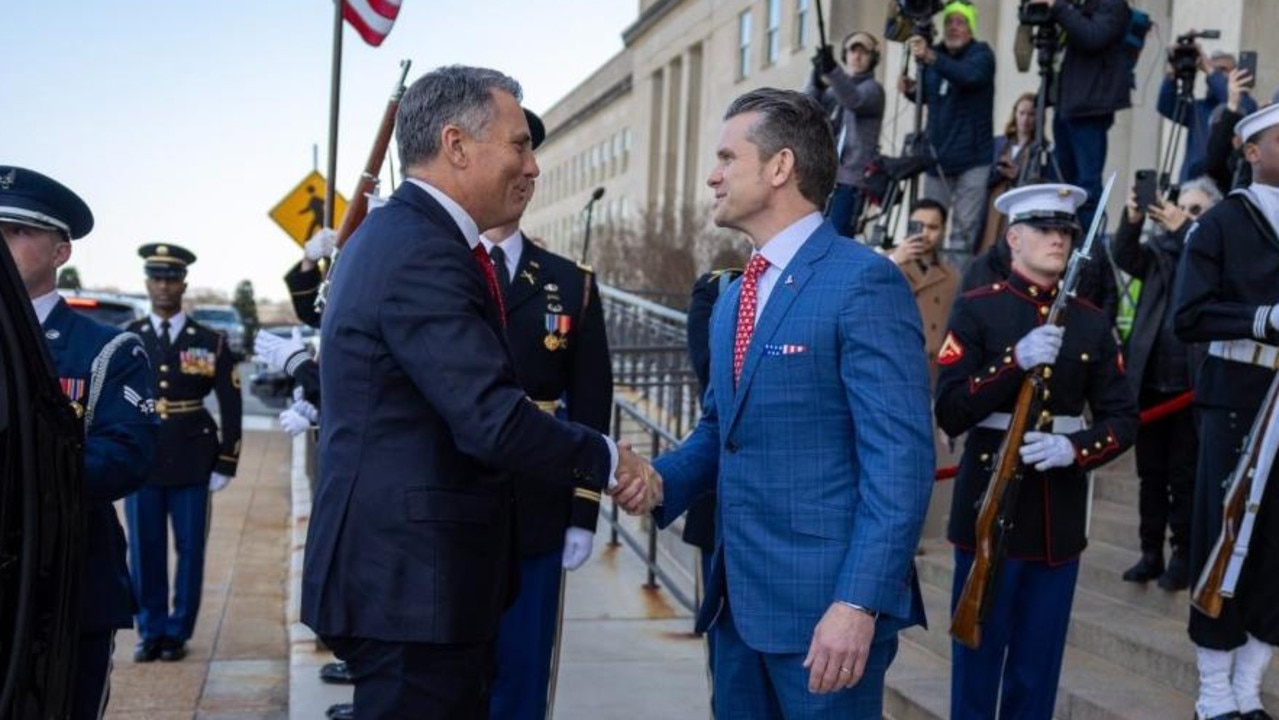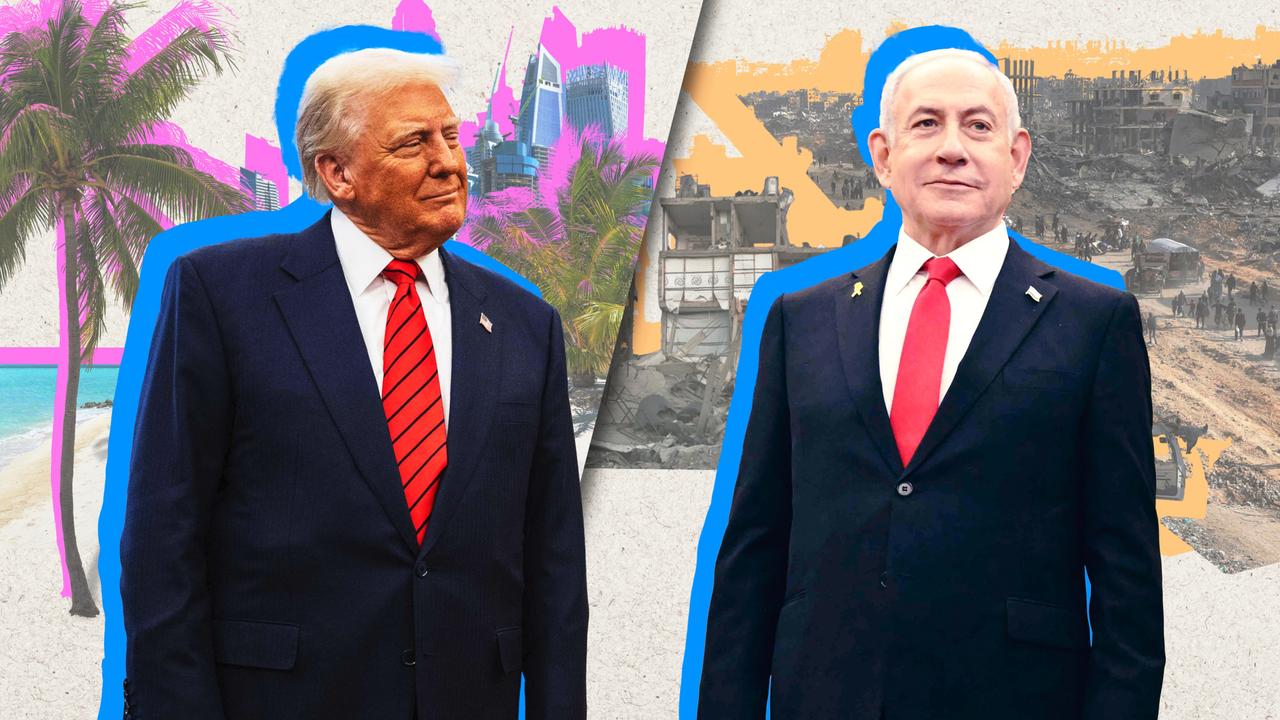Don’t ask: Shorten on climate policy costings
Bill Shorten attempted to repel attacks over Labor’s climate change agenda at an evenly matched final leaders debate.
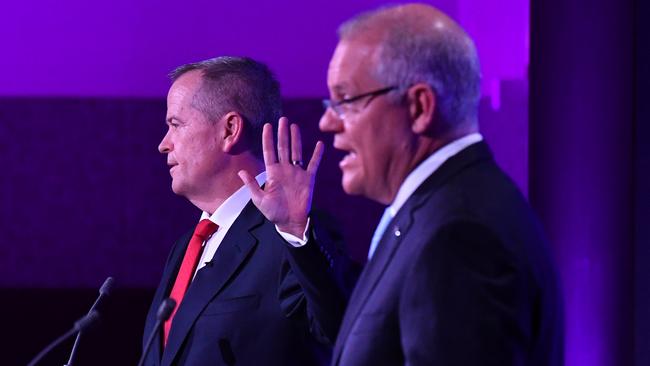
Bill Shorten attempted to repel attacks over Labor’s climate change agenda last night, claiming that questions over the cost of cutting emissions were “dishonest” during an evenly matched final leaders debate.
Scott Morrison and the Opposition Leader clashed again over Labor’s tax agenda, with Mr Shorten refusing to guarantee that house prices would not fall further and rents would not rise under his negative gearing clawback.
Now that the key battlelines are finetuned to a contest over tax, economic management and climate change, the Prime Minister launched his strongest attack yet on Labor’s $387 billion tax changes to superannuation, housing and self-funded retirement.
Mr Morrison said Australians had “got to the point where they’ve grown tired of politicians who come and say ‘Give me all your money and I’ll solve all your problems’ ”.
Mr Shorten returned fire, saying the country could no longer afford tax “gifts”, while arguing that climate change would be one of the defining issues of the election and branding questions over its cost as “dishonest”.
The comment was a dramatic escalation on his previous remark on the ABC’s Q&A on Monday when he said it was a “dumb question” to ask about the cost of his climate change policies.
“I’ll rephrase that,’’ he said last night. “I think it’s a dishonest question. The idea that you only look at the investments in new energy without looking at the consequences of not acting on climate change is a charlatan’s argument.
“It’s a crooked, charlatan argument.”
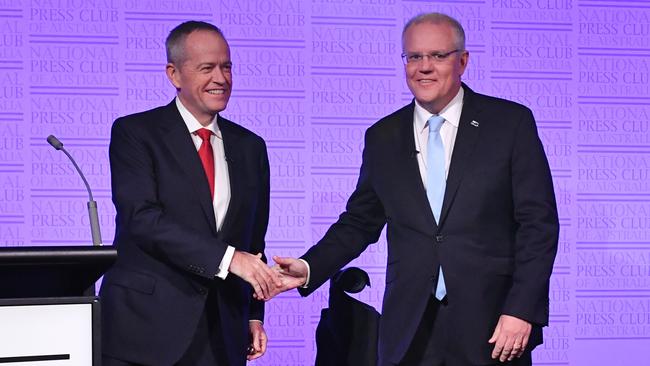
Mr Morrison said the Opposition Leader was being “shifty” and that people wanted to know the cost of his policies, declaring it was a fair question.
“Action is being taken (on climate change),” Mr Morrison said. “Businesses are making investments. They’re making themselves more competitive. They’re simply saying, ‘Tell us the price, Bill. Tell us the price.’ It’s not a dishonest question.”
Mr Shorten moved to expose the Prime Minister on the disunity of government and the revolving leadership door by claiming they were because of the Coalition’s divisions over climate change.
It was the costings of Mr Shorten’s signature health policies that the Labor leader fumbled over in the third debate of the campaign, held at the National Press Club in Canberra.
Mr Morrison had opened the door to supporting Labor’s Medicare cancer plan if it could be afforded in the next budget and challenged Mr Shorten to explain what Medicare benefit items he would change, and how he would keep cancer care prices down.
Mr Shorten replied that he had spoken to oncologists and specialists. “You’ll have competition, which means that if a specialist wants to be able to offer the full 100 per cent bulk-billing, then that will keep the others honest,” he said.
He also said the health costings would be revealed when Labor’s full policy suite, costed by the Parliamentary Budget Office, was released tomorrow.
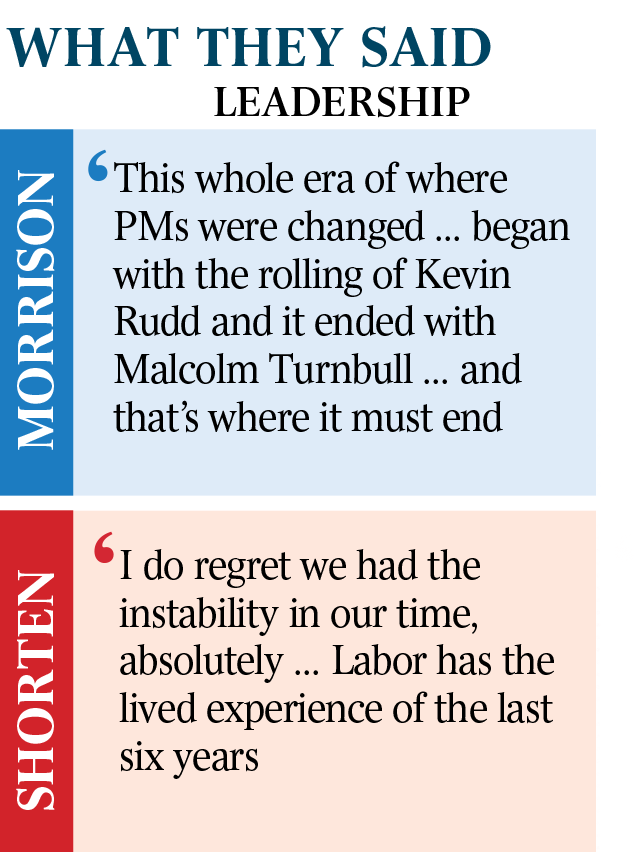
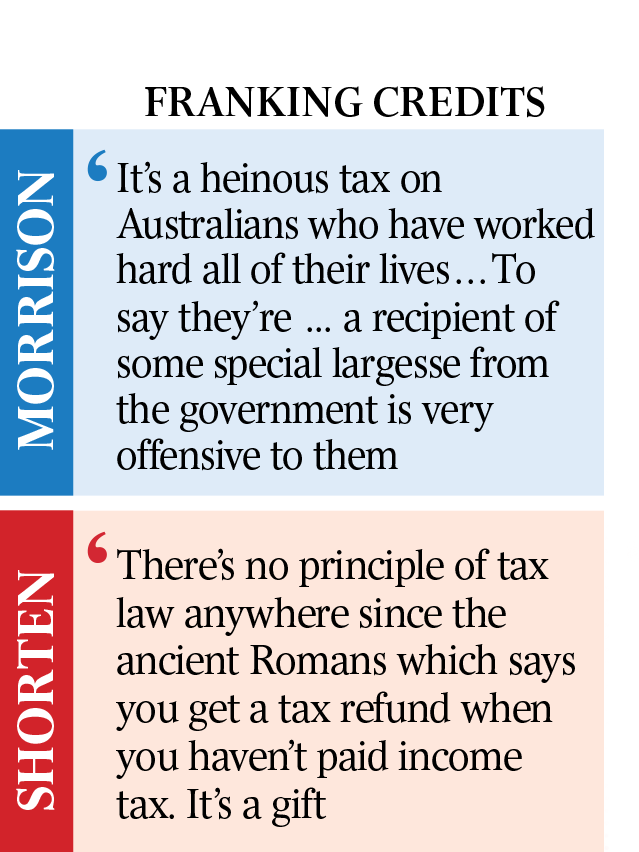
Mr Shorten also stumbled on the economy, arguing that his plan to “take real action on climate change” in addition to his planned infrastructure spending would help prevent a slide into deficit.
When asked how he would prevent the budget going into deficit, Mr Shorten said he would invest more money in infrastructure and build more public transport and roads. When challenged that to spend money on infrastructure, it had to come from somewhere, Mr Shorten steered the argument back to climate change.
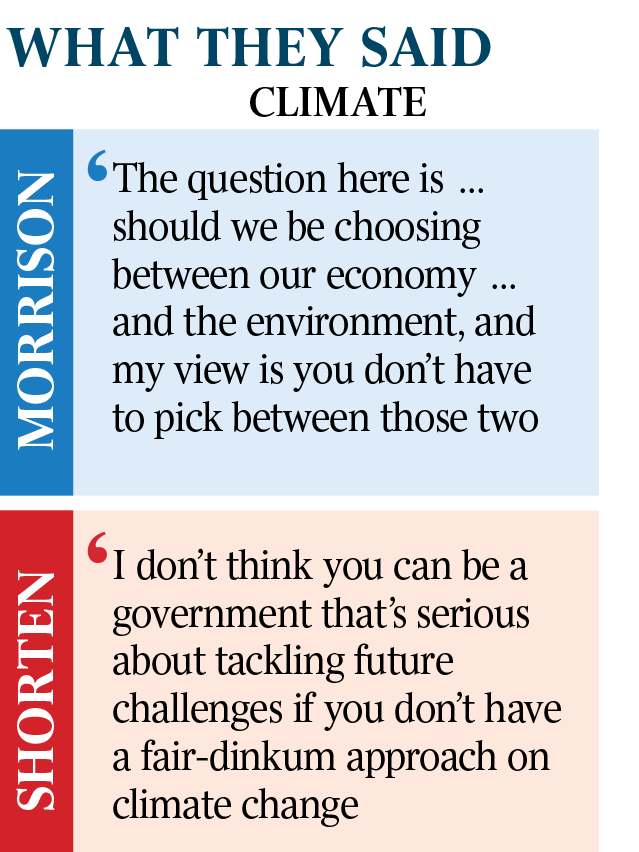
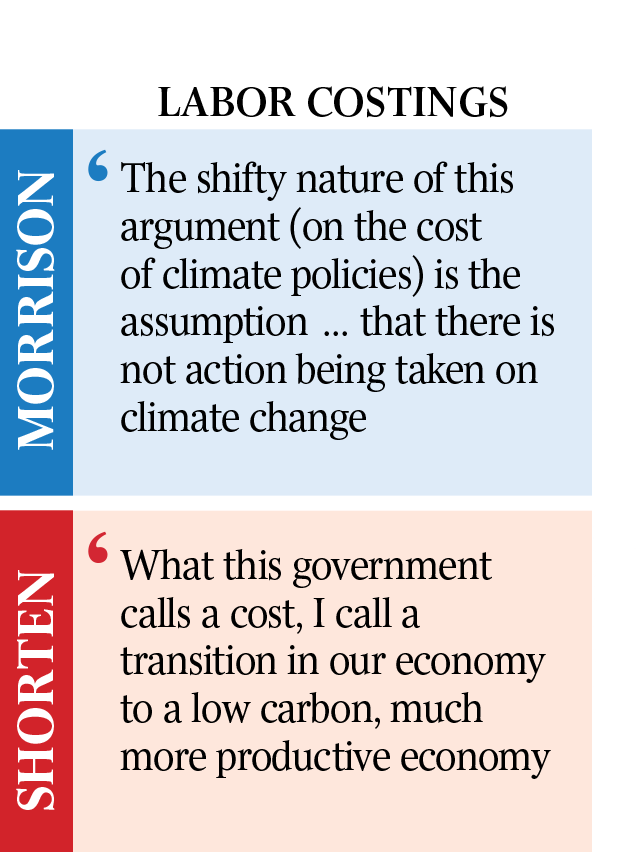
Mr Morrison said he had brought the budget back to surplus in the 2019-20 financial year through fiscal discipline.
“We’re the party and government that has done that,” he said. “And I think Australians can trust us to keep it in surplus.”
Mr Morrison took up the attack against Mr Shorten over his tax agenda, asking the Opposition Leader to guarantee that rents would not increase and that house prices would not decline under his negative gearing reforms.
Mr Shorten accused the government of mounting a scare campaign. “Can this country keep affording to give taxpayer expenditure to people who invest in existing houses, who buy existing houses and make a loss?” he said.
“As for falling house prices, the biggest falls in house prices have happened under this government’s watch. We hear from the government: ‘Nothing to see here. Move along, please. Climate change, childcare affordability, first-home buyers, no problems’ … They want more of the same of the last six years.”
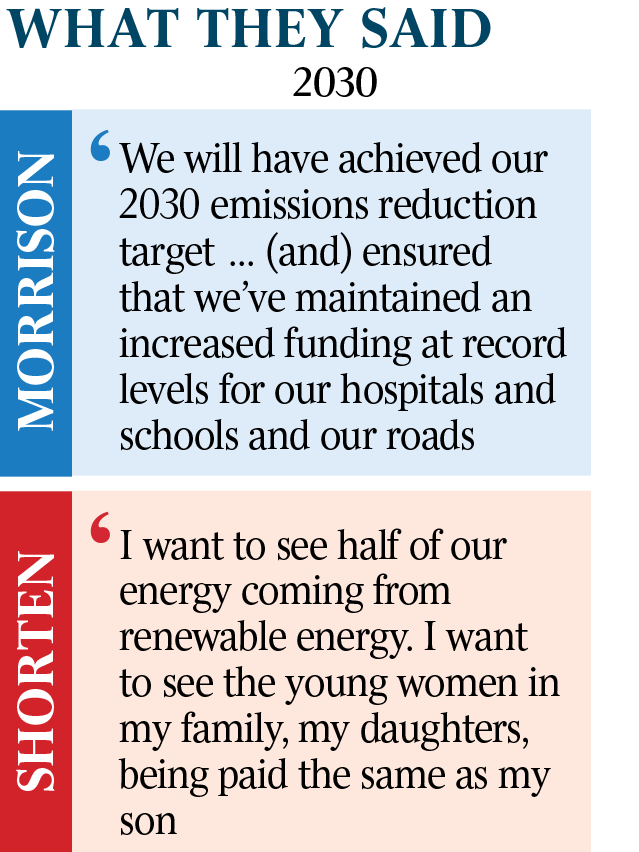
Mr Morrison declared Labor’s franking credit changes were a “heinous tax” and denied suggestions the Coalition leadership group had considered telling voters they would pass the overhaul through the parliament if Mr Shorten won the election.
“Politics isn’t about tactics; politics is about what you believe,” he said.
Mr Shorten said it was not fiscally sustainable to continue providing cash refunds for unused franking credits. “I can understand why some people don’t want to lose the money, I get it,” he says. “But there’s no principle of tax law anywhere since the ancient Romans which says you get a tax refund when you haven’t paid income tax. It’s a gift.”
In a bid to reassure voters that a re-elected Coalition would provide stable government, Mr Morrison said the Liberal leadership rules had changed to prevent attempts to remove prime ministers.
He said the culture of instability ended with the downfall of Malcolm Turnbull and he would serve as prime minister for a full term if re-elected, unlike his two predecessors. “This whole era of where PMs were changed during the course of elections … began with the rolling of Kevin Rudd and ended with Malcolm Turnbull. And that’s where it must end.”
Mr Shorten, who scribbled in a notepad between questions, linked Coalition leadership instability to splits inside the government over climate change and right-wing pushback. He said the instability within the Liberal Party had “nothing to do with rules”.
“They’ve got to do with climate change.” he said.
Additional reporting: Richard Ferguson, Greg Brown

